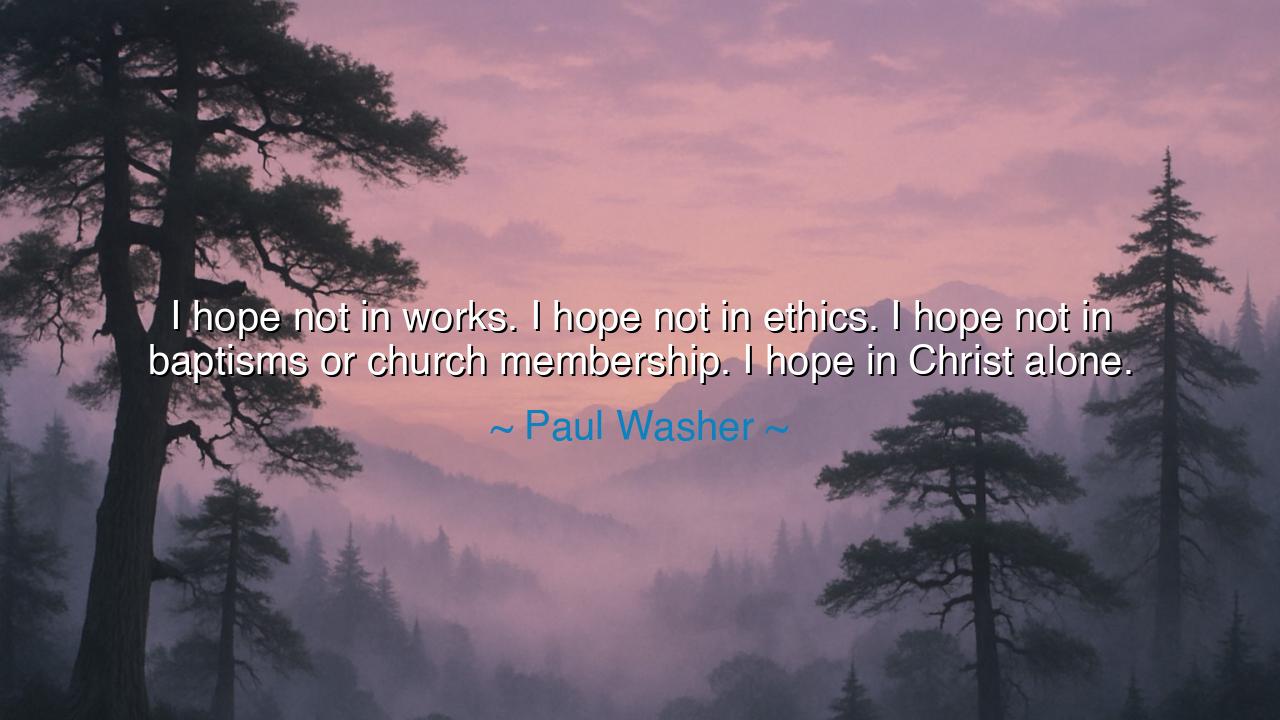
I hope not in works. I hope not in ethics. I hope not in baptisms
I hope not in works. I hope not in ethics. I hope not in baptisms or church membership. I hope in Christ alone.






In the solemn and soul-stirring words of Paul Washer, the preacher of conviction and fire, we hear this declaration of faith: “I hope not in works. I hope not in ethics. I hope not in baptisms or church membership. I hope in Christ alone.” This is no ordinary confession—it is the cry of a man who has looked beyond all earthly righteousness and found in himself nothing worthy of salvation. It is the voice of one who has seen that all human efforts, however noble, fall short before the holiness of God. In this utterance lies the very heart of the Gospel—the truth that salvation is not earned by the hands of man, but given by the grace of God through Christ alone.
Paul Washer, a contemporary evangelist known for his uncompromising preaching, spoke these words to awaken souls lulled into false security by religious routine. In an age when faith is often confused with ceremony, when morality is mistaken for redemption, Washer’s words thunder like a prophet’s rebuke. He reminds believers that Christianity is not a ladder climbed by deeds, but a cross embraced by faith. His message springs from the ancient doctrine proclaimed by the Reformers and rooted in the very Scriptures themselves: that “by grace you have been saved through faith—and this is not from yourselves, it is the gift of God.”
When he says, “I hope not in works,” Washer speaks against the pride that creeps into every human heart—the belief that one can earn divine favor by effort or virtue. The works of the flesh—charity, discipline, good conduct—though outwardly noble, cannot cleanse the soul of its inward stain. Likewise, “I hope not in ethics” rejects the idea that moral philosophy or upright living can substitute for the transforming power of the Spirit. Even “baptisms or church membership,” sacred though they are, are but symbols and institutions, powerless to save apart from true faith. Washer’s words strip away every illusion, until only the naked soul remains, standing before the cross, clinging to Christ alone as its sole refuge.
This truth, though simple, has shaken kingdoms and reformed nations. Recall the story of Martin Luther, the German monk who labored in fasting, confession, and penance, seeking peace with God through the works of religion. Yet his soul found no rest until he read the words of Scripture: “The righteous shall live by faith.” In that moment, the weight of centuries fell from his shoulders. He realized that no indulgence, no ritual, no priestly act could save him—only the mercy of Christ. From that revelation came the Reformation, a flame that lit the world anew. Luther, like Washer, stood upon the truth that man’s hope lies not in himself, but in the crucified and risen Savior.
To hope in Christ alone is to surrender all self-reliance, all pride, all pretensions of goodness. It is to cast oneself wholly upon the mercy of the One who bore the sins of the world. Such faith is not weak—it is the highest courage, for it confesses that man can neither save nor sanctify himself. It trusts not in performance but in promise; not in religion, but in relationship. It is a hope that transcends despair, because it rests not on shifting sand, but on the solid rock of Christ’s finished work. In this way, Washer’s declaration is not a rejection of good works, but their rightful reordering: good deeds flow not as the root of salvation, but as its fruit.
The world often resists such humility. It tells us to build our own worth, to trust our own wisdom, to measure our goodness against others. But faith calls us to do the opposite—to fall before the cross, confessing our need, and to rise again clothed not in our own righteousness, but in His. The man who hopes in Christ alone no longer fears judgment, for his hope rests not in his own perfection, but in the perfection of the Savior who took his place. His life becomes a song of gratitude, not striving—a living testimony that grace is greater than guilt.
The lesson, then, is both humbling and liberating: let go of every false anchor. Do not trust in your achievements, your knowledge, or your rituals to save you. Let your hope rest in the One who gave Himself for you. Walk in obedience, yes—but not to earn love, rather because you are already loved beyond measure. The works of faith, when born from gratitude, shine brighter than the works of pride. Hope in Christ alone, and your heart will know a peace that does not fade, even when the world trembles.
So remember, O seeker of truth, the eternal wisdom that Paul Washer proclaimed: when all your strength fails, when all your righteousness fades, one name remains—Christ alone. Trust Him wholly, and you will never stand condemned. For it is not the strength of your grasp that saves you, but the strength of the One who holds you fast. In Him is the end of striving, the beginning of freedom, and the everlasting hope that no power on earth or in heaven can take away.






AAdministratorAdministrator
Welcome, honored guests. Please leave a comment, we will respond soon